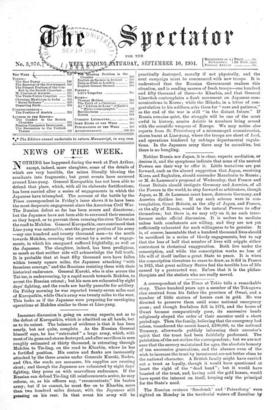Immense discussion is going on among experts, not as to
the defeat of Kuropatkin, which is admitted on all hands, but as to its extent. The balance of evidence is that it has been nearly, but not quite, complete. As the Russian General himself says, he has " extricated " a large army, which, with most of its guns and stores destroyed, and after sacrifices in men roughly estimated at thirty thousand, is retreating through Mukden to Tie-ling, on the road to Kharbin, where he has a fortified position. His centre and flanks are incessantly attacked by the three armies under Generals Kuroki, Nodzu, and Oku, the roads are morasses, his supplies are running short; and though the Japanese are exhausted by eight days' fighting, they press on with marvellous endurance. If the Russian can defend Tie-ling till reinforcements arrive, he may reform, or, as his officers say, " reconcentrate," his beaten army; but if he cannot, he must flee on to Kharbin, more than two hundred miles distant, with the Japanese still pressing on his rear In that event his army will be
practically destroyed, morally if not physically, and the next campaign must be commenced with new troops. It is understood that the Russian Government realises this situation, and is sending masses of fresh troops—one hundred and fifty thousand of them—to Kharbin, and that General Linevitch contemplates a flank movement on Japanese com- munications in Korea; while the Mikado, in a letter of con- gratulation to his soldiers, asks them for "care and patience," as the end of the war is still "in the distant future." If Russia remains quiet, the struggle will be one of the most - awful in history, armies Asiatic in numbers being armed with the scientific weapons of Europe. We may notice also reports from St. Petersburg of a mismanaged commissariat, stores burnt at Liao-yang, where the troops are short of food, and operations hindered by red-tape departmental regula- tions. In the Japanese army there may be casualties, but there is no bungling.


































